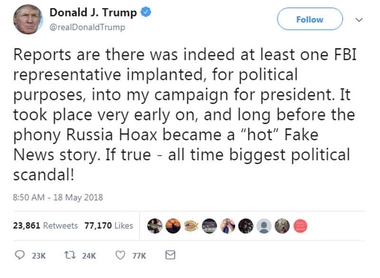Five times an incendiary pro-Trump claim on Russia fell flat - now there's a sixth

President Donald Trump started his Friday with a provocative tweet: "Reports are there was indeed at least one FBI representative implanted, for political purposes, into my campaign for president. It took place very early on, and long before the phony Russia Hoax became a 'hot' Fake News story. If true - all time biggest political scandal!"

CNN soon reported a very different story: There was an informant, but the person was not planted inside the Trump campaign, according to US officials.
The ricochet of information followed a familiar pattern during the Trump presidency, as the White House and its allies push back against the sprawling investigations into Russian meddling. First, there are explosive claims floated by Trump or his allies on Capitol Hill, including Rep. Devin Nunes, the California Republican who leads the House Intelligence Committee. Then, there's a combination of tweets and talking points on television. The final stage often includes either hedging, a public walk-back, or reporting from nonpartisan news outlets that debunks the original claims.
Here are five other times where this pattern played out:
Claim: Trump Tower wiretaps in 2016
Trump posted a now-infamous tweet at 6:35 a.m. on a Saturday just weeks into his presidency: "Terrible! Just found out that Obama had my 'wires tapped' in Trump Tower just before the victory. Nothing found. This is McCarthyism!" Trump went on to suggest that what former President Barack Obama did while still in office was illegal and that he was a "bad (or sick) guy."
The shocking allegation sent Washington scrambling. Were there wiretaps? Was it part of the FBI's investigation into Russian meddling? Did Obama have anything to do with it? Was Trump recorded?
Later, Nunes and Rep. Adam Schiff, D-California, shared a rare moment of bipartisanship and said they found the Trump Tower wiretap claim baseless. And then-FBI Director James Comey testified to Congress that the FBI "looked carefully" at the matter but concluded there was "no information that supports those tweets."
Claim: Improper unmasking of Trump aides
Once the Trump Tower wiretap flap died down, the White House and Nunes floated a new theory. In what is now referred to as the "midnight run," Nunes hastily exited an Uber one night, made his way to the White House grounds, and was shown classified documents about government surveillance.
The next day, Nunes delivered a bombshell. He said he "recently confirmed" that US intelligence agencies "collected information" on Trump transition officials, and that the Obama administration used these reports to improperly spy on the Trump transition operation. He said they abused a process called "unmasking" that reveals the identities of Americans mentioned in classified intelligence memos.
It didn't take long for the story to shift. And not long after the House Intelligence Committee was given a chance to read the underlying materials, CNN reported that multiple Democratic and Republican sources agreed that there was no evidence that Obama administration officials did anything unusual or illegal.
Claim: Oval Office tapes of Comey
Three days after he fired Comey in May 2017, Trump tweeted what looked like a veiled threat: "James Comey better hope that there are no 'tapes' of our conversations before he starts leaking to the press!"
White House aides dodged questions about whether tapes existed, but never offered a full denial. Meanwhile, Comey skeptically held out hope that there were tapes, because they could exonerate him. "Look, I've seen the tweet about tapes. Lordy, I hope there are tapes," he told the Senate Intelligence Committee.
Trump ended the speculation a few weeks later, saying "I did not make, and do not have, any such recordings." He claimed victory nonetheless, claiming -- again without evidence or further explanation -- that he scared Comey into changing his story.
Claim: A 'secret society' in the FBI
The saga began when Sen. Ron Johnson, R-Wisconsin, gave an interview about a new batch of text messages between two FBI agents who were having an affair while they worked on the Clinton and Russia investigations. "That secret society -- we have an informant that's talking about a group that were holding secret meetings offsite," Johnson said, before repeating the claim again in the interview.
Anger quickly spread among Hill Republicans and conservatives who have been increasingly critical of the FBI. Was there a group of anti-Trump agents that were secretly using the bureau to hurt him?
Under scrutiny, Johnson started backtracking, and admitted the text could be a joke. CNN later reported that the "secret society" reference was in fact about a gag gift -- a Vladimir Putin-themed calendar -- that was purchased by one of the staffers who worked on the early stages of the Russia investigation to distribute to colleagues.
Claim: Steele dossier triggered Russia probe
A regular rallying cry on conservative media and from Hill Republicans is that trigger-happy FBI agents used the Trump-Russia dossier to start the Russia investigation back in July 2016. The problem, they say, is that the dossier was written by a British ex-spy who was funded, indirectly, by the Clinton campaign.
Democrats pushed back on this claim from the very start. They argued that the FBI started its probe after the Australians shared intelligence with the FBI about Trump campaign aide George Papadopoulos, who had bragged to an Australian diplomat that he knew about the Russians having Clinton's emails.
In their final report released last month, House Intelligence Committee Republicans conceded the point, saying that the FBI "opened an enterprise counterintelligence investigation into the Trump campaign after receiving information related to Trump campaign foreign policy adviser George Papadopoulos."
By Marshall Cohen. The-CNN-Wire™ & © 2018 Cable News Network, Inc., a Time Warner Company. All rights reserved.
The Gayly – May 19, 2018 @ 10:40 a.m. CDT.





